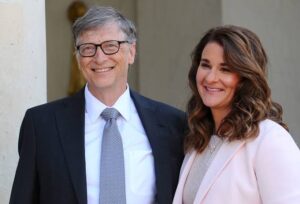
Billionaire philanthropists Bill and Melinda Gates will pay off $76 million of Nigeria’s debt through their namesake foundation. The payments, which will be made over the course of 20 years, are due to begin this year.
In 2014, Nigeria borrowed the money from Japan to fund its fight against the preventable disease, Quartz reports. The Bill & Melinda Gates Foundation has “agreed to repay the loan after Nigeria met the condition of achieving more than 80% vaccination coverage in at least one round each year in very high risk areas across 80% of the country’s local government areas,” according to Quartz.
No new cases of polio were reported in the country in 2017. That’s a drastic change from 2012, when Nigeria had over half of all polio cases worldwide, according to the publication.
In a recent blog post, Gates acknowledges the significant strides made towards wiping out the disease globally — 30 years ago, there were 350,000 cases of polio per year worldwide, while last year, that number dropped to just 21.
“The heroes who have made this progress possible are the millions of vaccinators who have gone door to door to immunize more than 2.5 billion children. Thanks to their work, 16 million people who would have been paralyzed are walking today,” Gates writes.
Polio is “a crippling and potentially deadly infectious disease,” which, after invading the nervous system, can cause paralysis. Among those paralyzed, two to 10 percent die.
The Gates Foundation spent $3 billion in 2017 to help stop the spread of the disease, and names polio eradication one of its “top priorities.” The foundation says it has supported the Global Polio Eradication Initiative’s efforts to wipe out the disease by contributing technical and financial resources to accelerate targeted vaccination campaigns, community mobilization and routine immunizations.
“Progress in fighting polio might be one of the world’s best-kept secrets in global health,” Gates previously acknowledged in the foundation’s 2017 annual letter. “If things stay stable in the conflicted areas, humanity could see its last case of polio this year.”
In 1988, the virus was present in over 125 countries, paralyzing about 1,000 children per day. Since then, cases of polio have decreased by over 99 percent.
The Gates’ donation is not out of character; in 2017, they gave $4.6 billion to their namesake organization. In addition to its work with polio, the foundation has also spent $1 billion in an effort to send over 20,000 kids to college and has committed millions more toward fighting Alzheimer’s and providing resources to women in developing countries.
Thanks in part to his massive philanthropic efforts, Gates is no longer the richest person in the world, a title that he had held for much of the last decade. Jeff Bezos is currently the richest person, with a net worth of more than $108 billion, according to Forbes. Gates is currently worth $92 billion.
However, Bloomberg notes that Gates would have a net worth of $150 billion if he had not been so generous. While Bezos is not known for being particularly philanthropic as billionaires go, in January he announced a $33 million donation toward TheDream.Us, an organization that provides scholarships to undocumented immigrants brought to the U.S. as children, known as “dreamers.”
Gates also founded The Giving Pledge with Warren Buffett. Its billionaire signers have promised to give away at least half of their wealth.
“We have been blessed with good fortune beyond our wildest expectations, and we are profoundly grateful,” Bill and Melinda wrote in their Giving Pledge letter, CNBC Make It previously reported. “But just as these gifts are great, so we feel a great responsibility to use them well.”
 Society Gazette Society Gazette News
Society Gazette Society Gazette News




